At least seven survivors were rescued from the rubble of earthquake-hit areas of Turkey, local media reported, eight days after the worst quake in the country's modern history.
It included a woman pulled out from the ruins of a building in the southern Turkish province of Hatay by Ukrainian rescue workers, broadcaster CNN Turk reported.
Earlier on Tuesday, an 18-year-old named Muhammed Cafer was rescued from the rubble of a building in southern Turkey some 198 hours after last Monday's earthquake, CNN Turk said.
Rescuers continued to pull out more survivors in Turkey, a week after two devastating earthquakes hit Turkey and Syria. In Adiyaman, 18-year-old Muhammed Cafer Cetin was rescued some 198 hours after the quakes, according to the Turkish Defence Ministry | https://t.co/JYfzTyYOhr pic.twitter.com/XRhkhdkUle
— RTÉ News (@rtenews) February 14, 2023
A short while earlier, rescue workers pulled two brothers alive from the ruins of an apartment block in neighbouring Kahramanmaras province.
State-owned Anadolu news agency identified them as 17-year-old Muhammed Enes Yeninar and his brother, 21-year-old Baki Yeninar, who was rescued after him.
Three other women, two in Hatay province and one in Kahramanmaras city, were also rescued, Turkish media reported.
The combined death toll in Turkey and neighbouring Syria from the disaster now exceeds 37,000.
17-year-old Muhammed Enes Yeninar has been pulled alive from the ruins of an apartment block in Kahramanmaras province of Turkey some 198 hours after last week's devastating earthquake | Read more: https://t.co/RpsgkLUL4j pic.twitter.com/X5AVL8gJ5F
— RTÉ News (@rtenews) February 14, 2023
More than seven million children have been affected by the massive earthquake, the United Nations said, voicing fears that "many thousands" more had died.
"In Turkey, the total number of children living in the 10 provinces hit by the two earthquakes was 4.6 million children. In Syria, 2.5 million children are affected," James Elder, spokesman for the UN children's agency Unicef, told reporters in Geneva.
We need your consent to load this rte-player contentWe use rte-player to manage extra content that can set cookies on your device and collect data about your activity. Please review their details and accept them to load the content.Manage Preferences
Turkey quake Europe's worst natural disaster in 'a century' - WHO
The World Health Organization said the earthquake, the epicentre of which was in Turkey, constituted the "worst natural disaster" in 100 years in its Europe region.
"We are witnessing the worst natural disaster in the WHO European region for a century and we are still learning about its magnitude," Hans Kluge, WHO regional director for Europe, told a press conference.
The WHO's European region comprises 53 countries, including Turkey. Syria is a member of the WHO's neighbouring Eastern Mediterranean region.
Dr Kluge also said the health body had "initiated the largest deployment of emergency medical teams" in the 75-year history of the WHO European region.
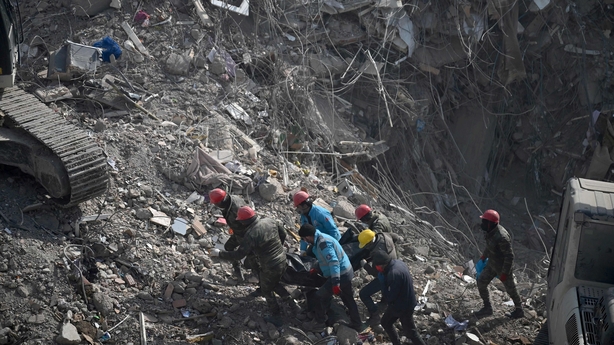
"Twenty-two emergency medical teams have arrived in Turkey so far," he noted, adding they would integrate into "Turkey's ongoing health response".
The confirmed death toll following the earthquake stands at 35,331, as officials and medics said 31,643 people had died in Turkey and at least 3,688 in Syria.
The toll has barely changed in Syria for several days and is expected to rise.
"The needs are huge, increasing by the hour. Some 26 million people across both countries need humanitarian assistance," Dr Kluge said.
Rescue teams scaling back operations
Rescuers again worked through the night to rescue people clinging to life. But some teams have started scaling back operations as low temperatures reduced the already slim chances of survival.
Some Polish rescuers, among many multinational teams that flew in, announcing they would leave tomorrow.
Earlier,, a boy and a man were saved in hard-hit Kahramanmaras, while rescuers were still trying to reach a grandmother, mother and daughter from one family who appeared to have survived in the broken masonry of a building
Search operations for more survivors beneath the rubble are about to end in the opposition northwest of Syria eight days after the earthquake, the White Helmets main rescue group said.
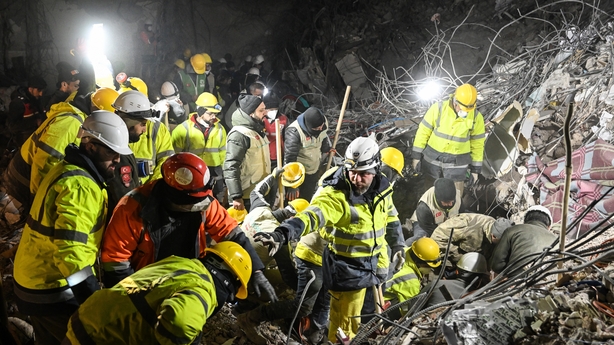
"It's about to come to a close. The indications we have are that there are not any (survivors) but we are trying to do our final checks and on all sites," said Raed al Saleh, who heads the White Helmets group that has carried out the major rescue operations in the devastated region.
The group, which has rescue workers across the region where whole neighbourhoods and villages were wiped out, said they were also collecting names of the missing people in the enclave where the group's latest death toll stood at 2,274 with thousands injured.
In the shattered Syrian city of Aleppo, UN aid chief Martin Griffiths also said the rescue phase was "coming to a close", with the focus switching to shelter, food and schooling.
Syrian President Bashar al-Assad had agreed to allow more UN aid to access the war-torn country from Turkey, diplomats said late yesterday.
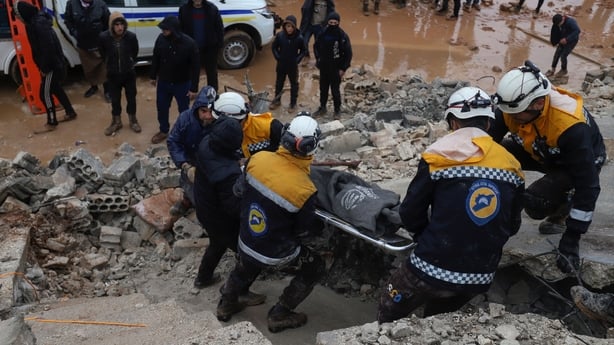
Turkish media said rescuers held out hope of finding survivors at several locations in Kahramanmaras province, Adiyaman and Hatay, where there were signs of life beneath the ruins.
But in the southern city of Antakya, excavators began tearing down heavily damaged buildings and clearing rubble. Blue lights from ambulances lit up the dim streets where there was still no power and the smell of smoke filled the air.
Hundreds of people are leaving the city every day, and those who remain huddle around fires on street corners and in parks, and sleep in tents or cars.
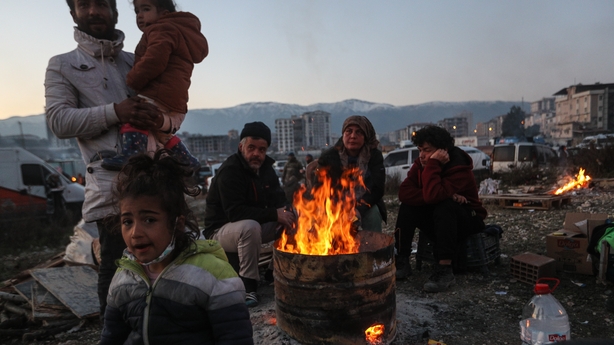
The earthquake was the sixth most deadly natural disaster this century, behind the 2005 tremor that killed at least 73,000 in Pakistan.
Turkey faces a bill of as much as $84bn, a business group said. Turkey's Urbanisation Minister Murat Kurum said some 42,000 buildings had either collapsed, were in urgent need of demolition, or severely damaged across 10 cities.
Dozens of residents and overwhelmed first responders who spoke to Reuters expressed bewilderment at a lack of water, food, medicine, body bags and cranes in the disaster zone in the first days after the quake, with many criticising what they said was a slow and centralised response by Turkey's Disaster and Emergency Management Authority (AFAD).
Said Qudsi travelled to Kahramanmaras from Istanbul and buried his uncle, aunt and their two sons, while their two daughters were still missing.
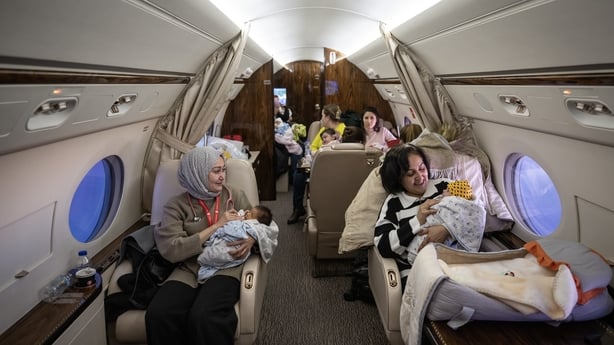
"People are not dead because of the earthquake, they are dead because of precautions that weren't taken earlier," he said.
Turkish President Tayyip Erdogan, who faces an election scheduled for June that is expected to be the toughest of his two decades in power, acknowledged problems in the initial response but said the situation was now under control.
Syria's rebel-held northwest has itself received little aid. A source from Hayat Tahrir al-Sham (HTS), an Islamist group which controls much of the region, told Reuters the group would not let in shipments from government-held areas and aid would come from Turkey.
Mr Assad has agreed to allow three border crossings to operate between Turkey and Syria for a three-month period, Mr Griffiths told a closed-door Security Council meeting on Monday, according to diplomats.
To date, there has been only one open, which has slowed the flow of necessary aid.
The head of a Syrian opposition-run rescue group denounced a UN decision to give Mr Assad authorisation over aid deliveries through border crossings with Turkey, saying it gave him "free political gain".

